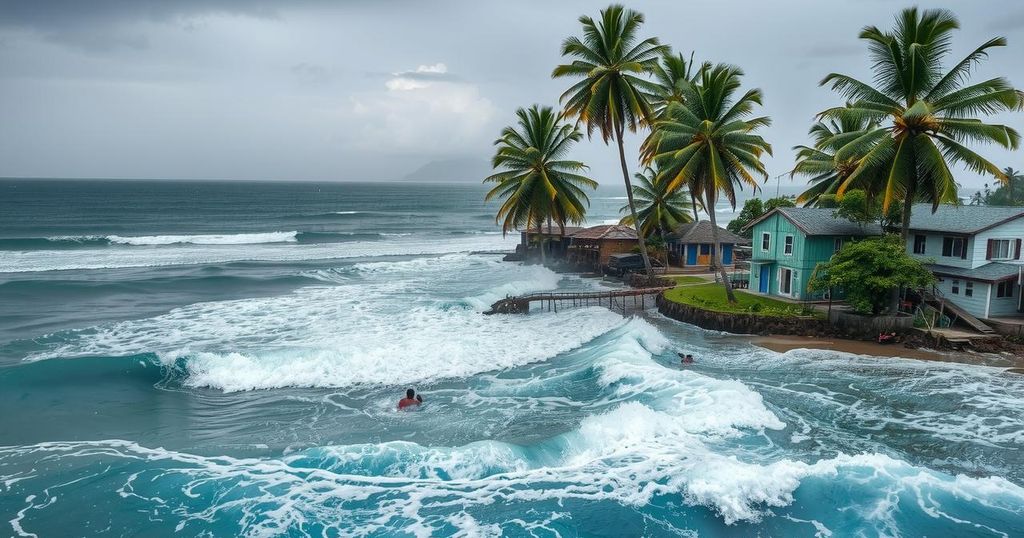Tropical Cyclone Chido devastated Mozambique from December 15, 2024, affecting nearly 454,000 people, leading to 120 fatalities and significant damage to housing and infrastructure. Ongoing crises, including a cholera outbreak, exacerbate humanitarian challenges. Urgent funding and resources are needed to assist affected populations and repair critical services.
Tropical Cyclone Chido has wrought significant destruction across Mozambique since making landfall on December 15, 2024. The cyclone unleashed torrential rains exceeding 250 mm within a 24-hour period and winds reaching up to 120 km/h. By December 18, it moved towards Malawi and subsequently dissipated in Zimbabwe. The National Institute for Natural Disasters (INGD) reported that as of December 24, approximately 453,971 individuals have been impacted, with tragic losses including 120 fatalities and 868 injuries. Extensive damage to infrastructure, including over 70,000 houses, 250 schools, and 52 health centers, has been observed, with numbers likely to climb as assessments progress.
Particularly affected are the Cabo Delgado Province districts of Mecufi, Metuge, and Chiure, alongside the provincial capital, Pemba, where an estimated 272,000 individuals face dire conditions. The joint multi-agency assessment confirmed widespread devastation, notably in Mecufi, where nearly all homes were destroyed. The cyclone has rendered countless families homeless, predominantly forcing them into makeshift shelters made from palm leaves while destroying essential health facilities and medical supplies.
Moreover, Nampula Province is enduring its own crisis, with 175,169 affected and over 35,000 homes damaged. A cholera outbreak has further complicated the public health emergency, with significant cases reported amidst damaged infrastructure hindering response efforts. Damaged roads have complicated evacuations and the delivery of necessities, while agricultural inputs are urgently needed to allow affected populations to participate in the main agricultural campaign by January 2025.
The government’s efforts have been pivotal in reducing casualties through preemptive evacuations and public warnings. Local authorities, humanitarian organizations, and UN teams are collaborating to deliver essential assistance; however, the overwhelming needs are exceeding the current capacities. There is an imperative need for safe shelters, food, potable water, medicines, and repairs to health facilities to restore basic services.
The new wave of displacement adds strain on communities already vulnerable from conflict. Concerns regarding gender-based violence (GBV) and loss of civil documentation are rampant, further exacerbated by the precarious living conditions of the displaced populations. Reports indicate an increase in GBV, necessitating a concerted response focusing on prevention and survivor support.
There is an urgent call for additional funding to sustain the humanitarian response as the cyclone has compounded existing crises, including a drought impacting 1.4 million people and ongoing conflict affecting 1.3 million. The humanitarian operation mobilized US$5.8 million within the 2024 Humanitarian Needs and Response Plan to prepare for and address these disasters. A prompt replenishment of humanitarian supplies is critical to contain cholera’s spread, assist agricultural recovery, and provide ongoing support to afflicted communities.
Tropical Cyclone Chido significantly impacted Mozambique starting December 15, 2024, causing substantial rainfall and damaging winds. The cyclone’s aftermath has led to a major humanitarian crisis, with nearly half a million people affected and infrastructure destroyed, including homes, schools, and health facilities. This disaster occurs amid other challenges, such as an ongoing cholera outbreak and conflict-induced displacements, necessitating a comprehensive humanitarian aid response. Community resilience is further threatened as the cyclone struck marginalized areas already grappling with insecurity and socio-economic stress.
In summary, Tropical Cyclone Chido has triggered a humanitarian crisis of significant proportions in Mozambique, with extensive loss of life, destruction of properties, and a burgeoning public health emergency due to cholera. The urgent need for assistance in the form of shelter, food, and medical supplies is paramount. It is crucial for local authorities and humanitarian partners to secure necessary funding and resources swiftly to address the immediate and long-term needs of the affected communities.
Original Source: www.unocha.org






